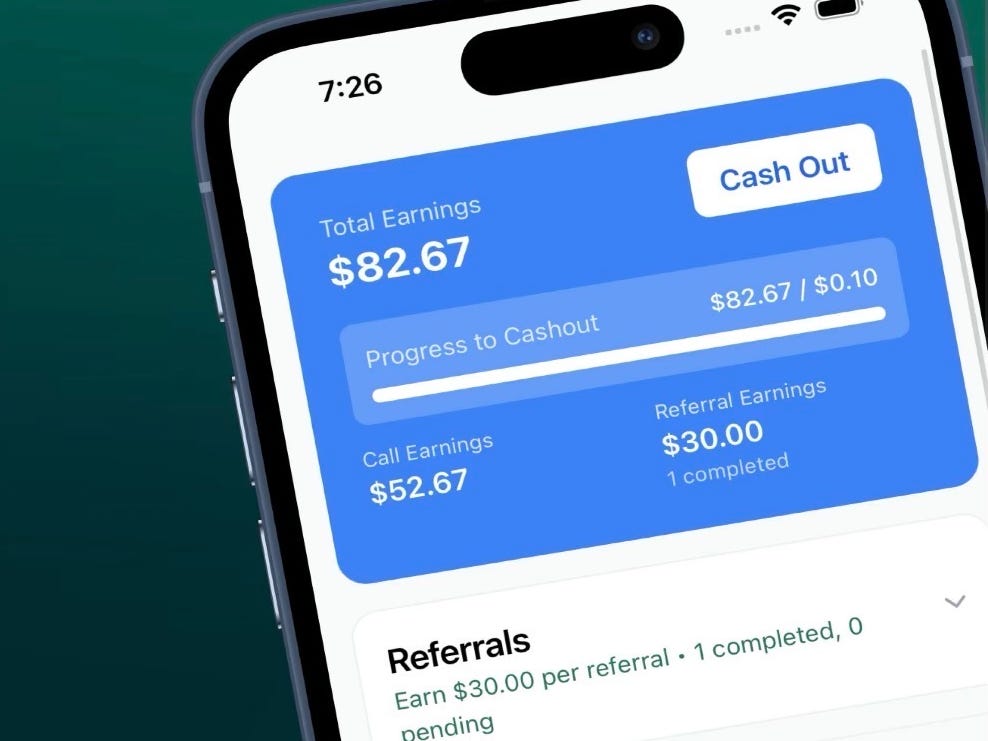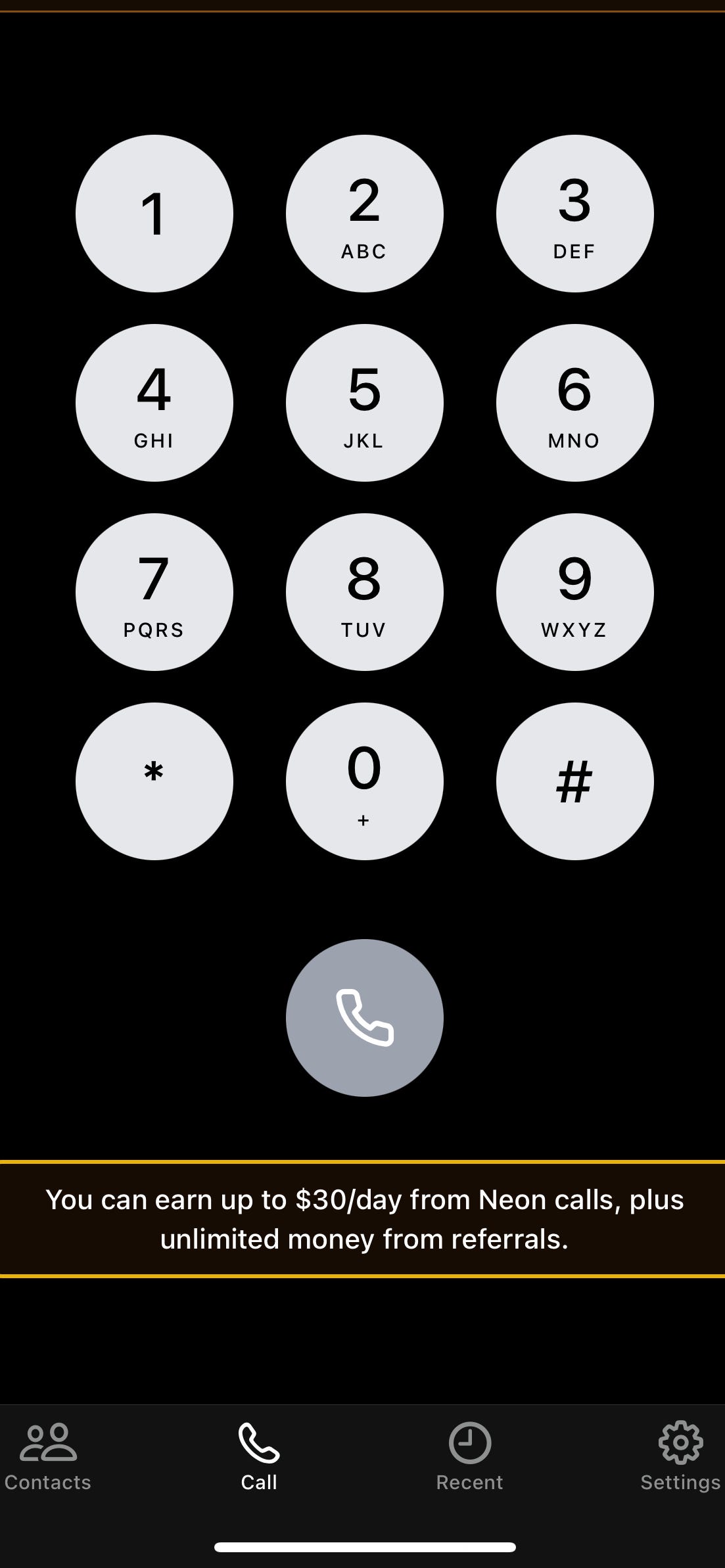
Neon/App Store
- Neon Mobile is a new buzzy app that offers to pay users to record their calls.
- Neon CEO Alex Kiam said he plans to sell the data to companies for AI model training, though he has yet to secure a buyer.
- After Neon rocketed up the App Store charts, Kiam took the app offline after TechCrunch reported it had a security vulnerability.
A new app that broke into the top ranks of the App Store has a very 2025-sounding proposition: allow an AI data company to record your phone calls in exchange for money.
Neon Mobile launched just over a week ago, but for a brief moment on Thursday, it was more popular than Meta’s Threads on the Apple App Store.
But the rising success story quickly came crashing back down to Earth later on Thursday after a data security vulnerability was thrust into the spotlight. The app has since been taken offline for a security audit that CEO Alex Kiam told Business Insider could take a week or two.
Neon’s premise is simple: You allow the app to record yourself during phone calls. The company said it pays 30 cents per minute for calls with other Neon users, or half of that if the other caller isn’t on Neon. In turn, the app says the data is “anonymized and sold to trusted tech companies.”
“Phone companies profit off your data. Now, you can too,” Neon’s website reads.
The arrangement, apart from sounding like something from an episode of “Black Mirror,” naturally raises all sorts of privacy concerns. It also illustrates the creative ways companies are finding to feed AI companies the large amounts of data they need to train their models.
On Thursday, those privacy concerns were front and center when TechCrunch reported that it had discovered a security flaw that “allowed anyone to access the phone numbers, call recordings, and transcripts of any other user.”
In one case, TechCrunch said it found “that the Neon servers could produce data about the most recent calls made by the app’s users, as well as providing public web links to their raw audio files and the transcript text of what was said on the call.”
Kiam told Business Insider that Neon would remain offline until his team had fixed the security issue and conducted a full security audit. The company would also establish new security safeguards, he said, including adding row-level security.
In an earlier phone call on Thursday before TechCrunch reported on Neon’s security vulnerability, Kiam said the app’s rise took him by surprise.
“Honestly, I did not expect this to grow this fast. I did expect us to reach this level and beyond, but I certainly didn’t expect everything to be this fast,” Kiam said.
Kiam, who graduated from Stanford’s MBA program in 2024, according to his LinkedIn, is 31 and previously worked at AI training platform Protege AI.
How Neon worked (when it was available)

Business Insider
Neon looks similar to other phone apps, but it’s what’s happening behind the scenes that differentiates the app from others.
To get started, users download the free app and verify their number. Then, using the app’s phonepad interface, they can place and receive calls.
From that point forward, they can start generating earnings, but only for calls made or received through the Neon app. (Using your iPhone or Android’s default phone app, for example, wouldn’t generate any payouts.)
Neon’s terms of service state that the app only records your side of the call. It says it will then pay you 30 cents per minute (15 cents if the person you’re calling isn’t a Neon user) for up to $30 per day. According to the company’s online FAQ, payouts are processed within three business days, “though timing may occasionally be shorter or longer.”
Neon’s terms say it removes personally identifiable information on the recording before any of the data is sold to AI companies.
“If anything, it’s too aggressive,” Kiam told Business Insider on Thursday, speaking about the app’s filtering process. “There’s stuff that it bleeps out that isn’t personally identifying and is actually kind of valuable to the AI companies. But we would rather, I think we’d rather would rather err on the side of just being fully just anonymized.”
Kiam said that Neon had yet to reach an agreement to sell any of its data.
Some state laws require that both parties consent to being recorded. In two-party consent states, both participants must give their consent for a call to be recorded, as opposed to one-party states, where only one participant needs to. It’s not entirely cut and dry, especially when someone is making a call from a state that has different requirements than where the person they are calling resides.
“We’ve spent a lot of time to make sure it’s legally compliant,” Kiam said. The startup is made up of four people, he told Business Insider.
According to AppFigures, an app-tracking firm, Neon had 299 downloads as of September 18. As of Wednesday, the firm estimates that 81,000 have downloaded it.
The app really began to take off starting at midnight on Wednesday, rising from No. 79 on Apple’s US top free apps charts to No. 6 within 3 hours, according to AppFigures data.
By Friday morning and following the TechCrunch report and the app going offline, Neon’s overall popularity had begun to decline. It was 14th overall among free apps on Apple’s App Store. It had dropped to third, behind Meta’s WhatsApp, among social networking apps.
As Big Tech companies and AI pioneers like OpenAI race to develop ever-more-capable AI models, an industry quickly emerged for providers of training data.
The best-known of these training companies is likely ScaleAI. Founded in 2016, Scale AI pays contract workers to label AI training data, which companies then pay Scale to access. In June, Meta spent roughly $15 billion to acquire a 49% stake in Scale. As part of the deal, Scale cofounder Alexandr Wang joined Meta as its chief AI officer, leading its new superintelligence lab.
Read the original article on Business Insider
The post Neon, a buzzy app that pays to record your calls for AI training data, goes offline to address a security scandal appeared first on Business Insider.




